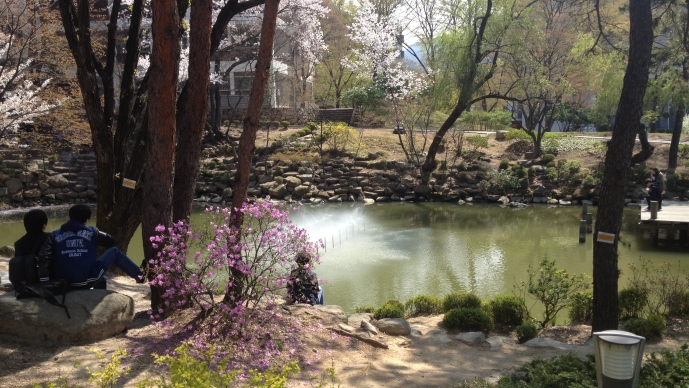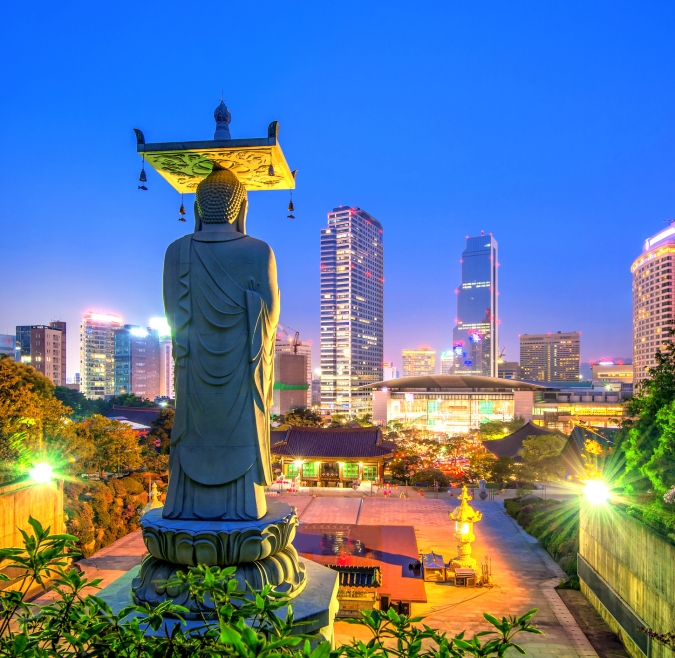Seoul National University (South Korea)
The Program
Lovers of contemporary Korean culture will find it easy to make Seoul their home
SNU is consistently ranked as a top university according to the QS World University Rankings and is very strong in most academic disciplines. The language of instruction at SNU is primarily Korean, however each department does offer several courses each semester taught in English. SNU offers a wealth of invaluable academic and cultural resources. Public lectures and forums are daily events and visits from renowned international speakers are common. It also has two nationally acclaimed museums, both of which add to the cultural vibrancy of the campus

Program Location

South Korea
Seoul
Seoul, the capital of the Republic of Korea, is among the world’s largest cities, with a population of more than 10 million. The city is said to be built on eight mountains—four inner mountains that surround the old city, and four outer—so expect some steep slopes and spectacular views. Seoul’s visitor highlights include the palaces of the Joseon Dynasty (1392-1897), the National Museum (of archeology, history, and art), the National Center for Korean Performing Arts, where you can attend regular performances, and Namsan Park. The city also has a vibrant nightlife with a variety of clubs, bars, cafés, and restaurants. Seoul may be large and the pace of life often frantic, but that doesn’t mean there’s no chance to relax—nothing gets in the way of the daily tea ceremony.
Academics
In order to have an idea of what classes are available, you should visit the SNU Academics web page. Students on the Seoul National University program will be able to choose from English-taught courses in a wide range of department as well as courses taught in Korea (if you have the requisite Korean language ability). SNU College of Business Administration is no longer available to exchange students so please do not plan to take any business classes.
When looking for courses, be sure that you are looking at courses for undergraduate students only and that you are looking at classes in the correct term of study. Fall semester at Rutgers is Semester II at Seoul National and Spring semester is Semester I.
Students will also be able to take Korean Language courses through the Korean Language Education Center. More information about these courses can be found on the LEI web page. Please note that the fees for Korean language courses are separate from the program cost that you will be charged through Rutgers.
Applicants who apply for the Korean History/ Psychology/ Statistics department must provide proof of Korean language ability. A satisfactory level of Korean language ability should be either (1) Level 5 or above of official Korean Language Proficiency Test or (2) Level 5 or above of the Korean Test conducted at the SNU Language Institute.
You will need to be sure that you are registered as a full time student according to Seoul National University and Rutgers University. That means you will need to take at least 12 credits each semester. Most classes at SNU are worth 3 credits. The credit translation system between SNU and Rutgers University is 1:1, meaning a 3-credit course at SNU will also be a 3-credit course on your Rutgers University transcript. It is not possible to take classes as not-for-credit or pass/fail.
For information about Study Abroad credit transfer, registration, and transcripts please visit the Academics section of our website.
Housing and Meals
Most international students are placed in on-campus housing in the Gwanaksa dormitory in double rooms. Every room is furnished with a bed, desk, chair, bookshelf, and telephone for each resident. Each room is also equipped with a LAN line for free Internet connection. Bed sheets and a laundry basket will also be provided to each resident at the time of check-in.
All buildings have air-conditioned lounges furnished with a TV/VCR, community refrigerator, electric range, induction ovens, washing machines and vacuum cleaners. Each building also has a reading room, which is usually located on the 4th floor and is open 24 hours. Meal plans are not included. On-campus housing placements are not guaranteed and are made on a first-come, first-served basis.
For more information, please visit the Gwanaksa dormitory web page.
Financial Information
Program Costs
| NJ Residents | Non-NJ Resident | |
|---|---|---|
| ATW Program cost* | $12,000 | $16,200 |
Program Cost includes:
• Tuition
• Administrative Fees
• Emergency Medical Access Abroad
• *Access the World (ATW)
Out-of-Pocket Costs
| Housing | $2,400 |
| Meals | $2,250 |
| Airfare | $1,500 |
| Local Transportation | $150 |
| Visa (Estimate is for US Citizens) | $92 |
| Books and Classroom Materials | $750 |
| South Korean Health Insurance | $250 |
| Personal Expenses | $1,500 |
| Total | $8,892.00 |
Out-of-Pocket Cost includes:
The above costs are estimations and represent the known out-of-pocket costs students encounter during their time abroad.
Some of these expenses will be paid for prior to going abroad, such as an airline ticket and visa costs, while some of these expenses, such as meals and local transportation, will be paid in-country as part of your daily expenses. As you plan, you will need to budget these costs and spend wisely throughout your time abroad.
Program Costs
| NJ Residents | Non-NJ Resident | |
|---|---|---|
| ATW Program cost* | $12,000 | $16,200 |
Program Cost includes:
• Tuition
• Administrative Fees
• Emergency Medical Access Abroad
• *Access the World (ATW)
Out-of-Pocket Costs
| Housing | $2,400 |
| Meals | $2,250 |
| Airfare | $1,500 |
| Local Transportation | $150 |
| Visa (Estimate is for US Citizens) | $92 |
| Books and Classroom Materials | $750 |
| South Korean Health Insurance | $250 |
| Personal Expenses | $1,500 |
| Total | $8,892.00 |
Out-of-Pocket Cost includes:
The above costs are estimations and represent the known out-of-pocket costs students encounter during their time abroad.
Some of these expenses will be paid for prior to going abroad, such as an airline ticket and visa costs, while some of these expenses, such as meals and local transportation, will be paid in-country as part of your daily expenses. As you plan, you will need to budget these costs and spend wisely throughout your time abroad.

